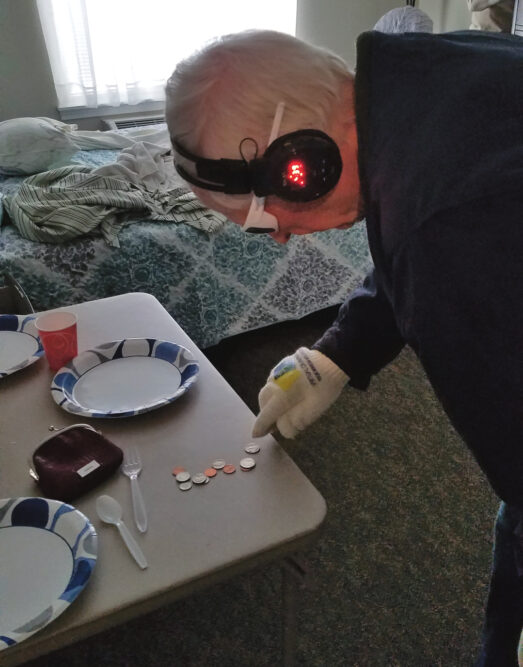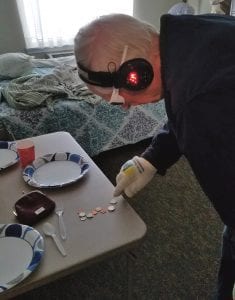
Home » Virtual tour helps people understand what it’s like to live with dementia
Virtual tour helps people understand what it’s like to live with dementia

November 14, 2018
A man whose mother faced down Alzheimer’s wants to educate others about dementia by giving them a virtual tour through the disease.
“We impair your senses to mimic or give your brain the thought of what it might feel like to have dementia,” said Rick Bennett, who owns a business called The Dementia Coach.
Bennett’s interest in senior care started when his mother was diagnosed with Alzheimer’s.
“My sister and I started noticing mom was getting more forgetful. Back in those days, everyone was afraid of the ‘A’ word. It took (doctors) a year to come out and say, ‘Yes, she has Alzheimer’s,’ ” he said.
After his mother died, Bennett wanted to use the experience he gained to help seniors with memory loss and cognitive dysfunction. In 2013, he opened Bennett House, an adult day care center in Coeur d’Alene, Idaho.
It didn’t take long for Bennett to realize many caregivers struggle to understand the disease.
“They just found out their mom has Alzheimer’s and they don’t know where to start. There’s information overload and it paralyzes them,” he said. “I started coaching people, then I realized there’s a real opportunity to help people.”
In 2018, Bennett sold the adult day care center and launched The Dementia Coach.
“I sit down with families and we just talk about (the disease). The No. 1 thing I want to get across to them is, ‘Don’t worry, you’re not alone. I’ve got your back.’ To see the stress go out of their faces when I say that—there’s no other feeling,” Bennett said.
He also works with senior care facilities to provide training and seminars. Bennett wanted to go beyond the traditional learning models and obtained a licensing agreement to share the Virtual Dementia Tour—a tool developed by P.K. Beville—to help people understand what it’s like to be cognitively impaired.

In October, more than 85 staff members were trained at Guardian Angel Homes in Richland. Family members, first responders and the public also were invited to participate.
During the tour, people wore gloves to impair their dexterity since many dementia patients lose the ability to touch and feel. Glasses with a black dot in the center and a yellow tint on the lenses simulated macular degeneration. A headset provided what Bennett called “confusion noise.”
“You and I can have a conversation, but in the background you hear a horn or something. The brain knows the background noise has nothing to do with our conversation, but with dementia all sound becomes equal,” he said. “So imagine having a conversation and all the noise is the same volume. What that would do to the brain is drive you nuts. As the brain dies, all your senses begin to die off.”
Symptoms of dementia include repetitive behavior, mumbling, humming and negative statements.
Observers took notes about participants in the Virtual Dementia Tour to compare their actions and responses with those of real patients.
The tour lasts eight minutes, but Bennett said for many people, it feels longer.
“The goal of the virtual tour is to give those professional caregivers that ‘ah ha’ moment. The most common response I get after it’s done is, ‘Oh my goodness, I had no idea,’ ” Bennett said. “About 20 percent of professional caregivers come out of the tour and they are physically shaken up.”
Tyson Frantz, a partner at Guardian Angel Homes, which has locations in Idaho, Washington and Oregon, said the most powerful moment during the tour was reading the comments made by the person trained to observe him for symptoms.
“You fumble around, wandering and rummaging, chuckling for no apparent reason,” Frantz said. “I was content, but from the outside I was presenting what someone with Alzheimer’s might present. It reinforces that just because someone doesn’t appear to do what they should be doing, it doesn’t mean they’re not functioning upstairs. It’s a good perspective shift.”
About 85 percent of patients living at Guardian Angel Homes’ facilities have Alzheimer’s, dementia or memory loss.
Nearly 25 percent of Americans 65 and older have mild cognitive impairment while about 10 percent have dementia, according to a professor at the University of Michigan.
Dementia is an umbrella term that Alzheimer’s disease can fall under. However, people can have more than one type of dementia. The Alzheimer’s Association reports that the disease is the sixth leading cause of death in the United States, killing more than breast cancer and prostate cancer combined. Every 65 seconds, someone in the United States develops Alzheimer’s, which is why educating people about living with the disease is so important, Bennett said.
Bennett has plans to open a satellite office in Richland or Kennewick to continue training providers and individual caregivers.
“I want to have my own place here. What I’m trying to do is get maybe a house with commercial abilities—big enough with office space to hold virtual tours in,” said Bennett, who recently hired someone to add autism tours to his educational offerings. “My new guy has 30 years of experience with autism. His expertise is a new product we’re launching in the spring. It’s first-of-a-kind out here—a virtual autism tour. It’s going to be very much like the Virtual Dementia Tour but geared around autism.”
For more information about The Dementia Coach and Virtual Dementia Tour, contact Rick Bennett at 208-651-1808 or rick@thedementiacoach.com.
Local News
KEYWORDS november 2018





